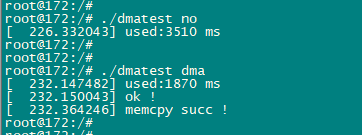Linux DMA 内存拷贝与memcpy 速率比较
驱动层代码:
#include 应用层测试代码:
#include \n" );
}
int main(int argc ,char **argv)
{
if(argc < 2)
{
print_usage(argv[0]);
return -1;
}
int fd = open("/dev/my-dma",O_RDWR);
if(fd < 0)
{
printf("open /dev/my-dma failed!\n");
return -1;
}
if(strcmp("dma", argv[1]) == 0)
{
ioctl(fd,MEMCPY_DMA);
}
else
{
ioctl(fd,MEMCPY_NO_DMA);
}
close(fd);
}
测试结果:(H3 平台)
DMA 比 memcpy 快一倍!

疑问:
tx = dmaengine_prep_dma_memcpy(chan, dst_phys, src_phys, BUFF_SIZE, DMA_PREP_INTERRUPT|DMA_CTRL_ACK);
这里的 tx 没有看到 在哪 free 的,是否会内存泄漏?
答:不会,传输完成后由中断处理函数自动释放内存。
代码跟踪:
dmaengine_prep_dma_memcpy
sun6i_dma_prep_dma_memcpy
return vchan_tx_prep(&vchan->vc, &txd->vd, flags);
list_add_tail(&vd->node, &vc->desc_allocated);
先看 struct virt_dma_chan
struct virt_dma_chan {
struct dma_chan chan;
struct tasklet_struct task;
void (*desc_free)(struct virt_dma_desc *);
spinlock_t lock;
/* protected by vc.lock */
struct list_head desc_allocated;
struct list_head desc_submitted;
struct list_head desc_issued;
struct list_head desc_completed;
struct virt_dma_desc *cyclic;
};
里面包含了void (*desc_free)(struct virt_dma_desc *); desc_free 函数。
来看一下desc_free 函数在哪被调用?
sun6i_dma_probe
vchan->vc.desc_free = sun6i_dma_free_desc;
vchan_init
tasklet_init(&vc->task, vchan_complete, (unsigned long)vc)
vchan_complete
list_for_each_entry_safe(vd, _vd, &head, node) {
dmaengine_desc_get_callback(&vd->tx, &cb);
list_del(&vd->node);
if (dmaengine_desc_test_reuse(&vd->tx))
list_add(&vd->node, &vc->desc_allocated);
else
vc->desc_free(vd); //最终调用 sun6i_dma_free_desc
dmaengine_desc_callback_invoke(&cb, NULL);
}
ret = devm_request_irq(&pdev->dev, sdc->irq, sun6i_dma_interrupt, 0,
dev_name(&pdev->dev), sdc);
sun6i_dma_interrupt // dma 中断处理函数
vchan_cyclic_callback
tasklet_schedule(&vc->task) //这里之后调用 vchan_complete
static void sun6i_dma_free_desc(struct virt_dma_desc *vd)
{
struct sun6i_desc *txd = to_sun6i_desc(&vd->tx);
struct sun6i_dma_dev *sdev = to_sun6i_dma_dev(vd->tx.chan->device);
struct sun6i_dma_lli *v_lli, *v_next;
dma_addr_t p_lli, p_next;
if (unlikely(!txd))
return;
p_lli = txd->p_lli;
v_lli = txd->v_lli;
while (v_lli) {
v_next = v_lli->v_lli_next;
p_next = v_lli->p_lli_next;
dma_pool_free(sdev->pool, v_lli, p_lli);
v_lli = v_next;
p_lli = p_next;
}
kfree(txd); //释放内存
}